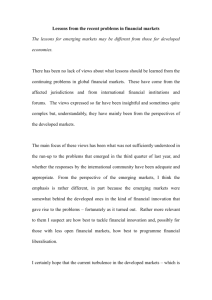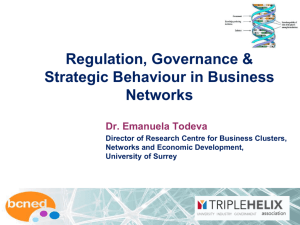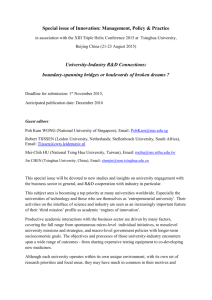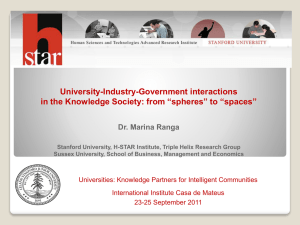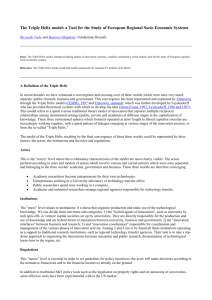Call for Papers THJ
advertisement
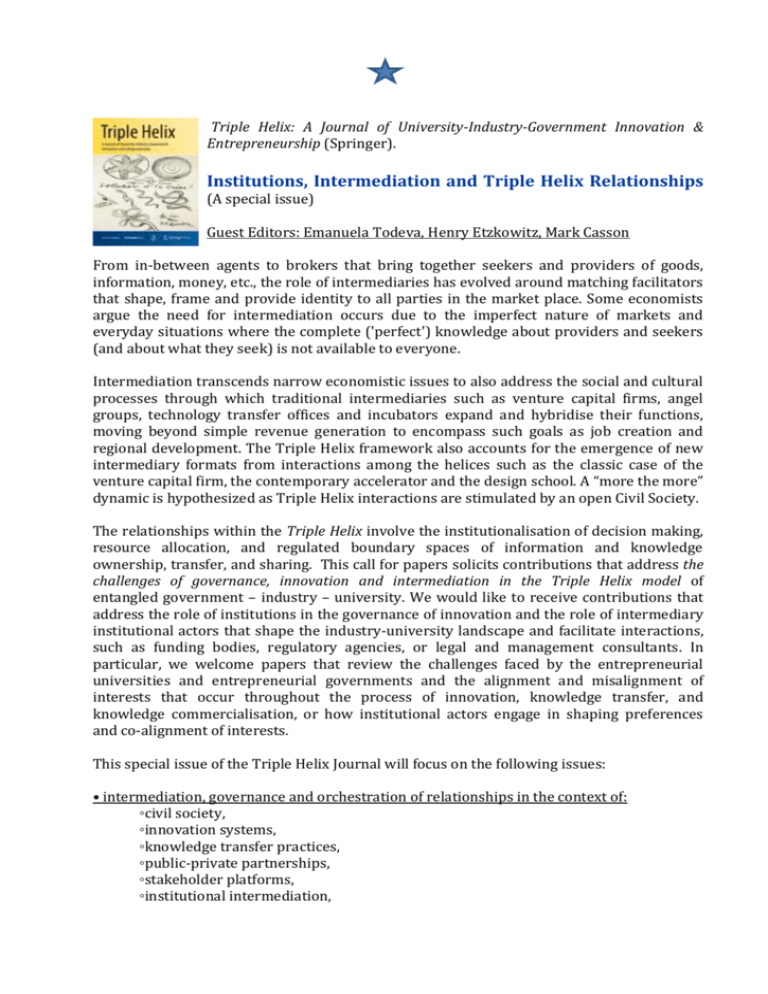
Triple Helix: A Journal of University-Industry-Government Innovation &
Entrepreneurship (Springer).
Institutions, Intermediation and Triple Helix Relationships
(A special issue)
Guest Editors: Emanuela Todeva, Henry Etzkowitz, Mark Casson
From in-between agents to brokers that bring together seekers and providers of goods,
information, money, etc., the role of intermediaries has evolved around matching facilitators
that shape, frame and provide identity to all parties in the market place. Some economists
argue the need for intermediation occurs due to the imperfect nature of markets and
everyday situations where the complete ('perfect') knowledge about providers and seekers
(and about what they seek) is not available to everyone.
Intermediation transcends narrow economistic issues to also address the social and cultural
processes through which traditional intermediaries such as venture capital firms, angel
groups, technology transfer offices and incubators expand and hybridise their functions,
moving beyond simple revenue generation to encompass such goals as job creation and
regional development. The Triple Helix framework also accounts for the emergence of new
intermediary formats from interactions among the helices such as the classic case of the
venture capital firm, the contemporary accelerator and the design school. A “more the more”
dynamic is hypothesized as Triple Helix interactions are stimulated by an open Civil Society.
The relationships within the Triple Helix involve the institutionalisation of decision making,
resource allocation, and regulated boundary spaces of information and knowledge
ownership, transfer, and sharing. This call for papers solicits contributions that address the
challenges of governance, innovation and intermediation in the Triple Helix model of
entangled government – industry – university. We would like to receive contributions that
address the role of institutions in the governance of innovation and the role of intermediary
institutional actors that shape the industry-university landscape and facilitate interactions,
such as funding bodies, regulatory agencies, or legal and management consultants. In
particular, we welcome papers that review the challenges faced by the entrepreneurial
universities and entrepreneurial governments and the alignment and misalignment of
interests that occur throughout the process of innovation, knowledge transfer, and
knowledge commercialisation, or how institutional actors engage in shaping preferences
and co-alignment of interests.
This special issue of the Triple Helix Journal will focus on the following issues:
• intermediation, governance and orchestration of relationships in the context of:
◦civil society,
◦innovation systems,
◦knowledge transfer practices,
◦public-private partnerships,
◦stakeholder platforms,
◦institutional intermediation,
◦multi-level and network governance,
◦technology mediated relationships, or
◦other modalities of government-university and industry interactions
• brokerage, bridging and third party activities in the context of:
◦university-industry engagement,
◦government-industry lobbying, information exchange and policy implementation,
◦self-regulation and normative activities by industry,
◦stakeholder activism, representation and mediated dialogue,
◦research funding,
◦R&D collaboration, or
◦skills and capabilities development
Participants are invited to address the intermediation theory and practice from a particular
disciplinary perspective and/or a specific case of facilitation, intervention intermediation or
orchestration of university-industry-government interactions. Contributions may focus
especially, but not exclusively, on the following questions:
•Does the innovation process require intermediation and what intermediaries
are ready to step-in
•Who are the actors mediating in regional development projects and how do
these actors mediate between infrastructures, nature, urban spaces, regulators,
providers and consumers
•How intermediaries govern in sociotechnical networks
•What intermediations take place in urban development
•What is the role of institutional intermediation in stakeholder engagement
•What are the trade-offs in intermediation
•Can transparency be achieved in intermediation, orchestration and brokerage
•How diplomacy and orchestration are practiced within the Triple Helix model
•How intermediaries deal with ‘conflict of interests’, and deliver ‘good valuefor-money’
Provisional References:
Beesley, LGA (2003) Science policy in changing times: are governments poised to take full
advantage of an institution in transition?, Research Policy, Volume: 32 Issue: 8 Pages:
1519-1531.
Boase, JP (1996) Institutions, institutionalized networks and policy choices: Health policy in
the US and Canada, Governance: An International Journal Of Policy And Administration,
Volume: 9 Issue: 3 Pages: 287-310.
Eising, R. (2004) Multilevel governance and business interests in the European Union,
Governance-An International Journal Of Policy Administration And Institutions, Volume:
17 Issue: 2 Pages: 211-245.
Etzkowitz, H. (2008) The Triple Helix: University–Industry–Government Innovation in Action.
New York, Routledge.
Etzkowitz, H. and Ranga, M. (2009) A Trans-Keynesian Vision of Government’s Role in
Innovation: Picking Winners Revisited, Science and Public Policy, 36 (10): 799-808.
Etzkowitz, H., & Leydesdorff, L. (2000) The dynamics of innovation : from National Systems
and “Mode 2” to a Triple Helix of university – industry – government relations, Research
Policy, 29 (2): 109-123.
Fitzgerald, H and Barerstock, R. (2013) Book Review: Cooper Offers Higher Education
Prescription for a Knowledge Economy and a Knowledge Society, Journal of Community
Engagement and Scholarship, Vol 6 No.1
Galindo, P. V., Vaz, T. D. N., & Nijkamp, P. (2011) Institutional capacity to dynamically
innovate: An application to the Portuguese case, Technological Forecasting and Social
Change, 78(1), 3-12.
Hrabanski, Marie (2012) Representation of sugar in Brussels: Historical sociology of the
lobbying of European institutions since the early 20th century, International Sugar
Journal, Volume: 114 Issue: 1367 Pages: 785-+
Jun, Lan (2008) A Dynamic Analysis of Triple Helix of Industry-university-research
Institution: the Case of China, IEEE, Conference: 4th International Conference on
Wireless Communications, Networking and Mobile Computing, Dalian, Peoples R China
Date: OCT 12-17, 2008, Science Research Publishing: Pages: 12880-12885.
Kilelu, Catherine W., Klerkx, Laurens, Leeuwis, Cees (2013) Unravelling the role of
innovation platforms in supporting co-evolution of innovation: Contributions and
tensions in a smallholder dairy development programme, Agricultural Systems, 118: 6577.
Lee, Duk Hee; Seo, Il Won; Choe, Ho Chull; et al. (2012) Collaboration network patterns and
research performance: the case of Korean public research institutions, Scientometrics,
Volume: 91 Issue: 3 Pages: 925Ollila, Susanne; Elmquist, Maria (2011) Managing Open Innovation: Exploring Challenges at
the Interfaces of an Open Innovation Arena, Creativity And Innovation Management
Volume: 20 Issue: 4 Pages: 273-283.
Perez, Oren (2012) E-Democracy, Transnational Organizations, and the Challenge of New
Techno-Intermediation, in Coleman, S; Shane, PM (eds.) Connecting Democracy: Online
Consultation And The Flow Of Political Communication Pages: 357-376.
Robin, Stephane; Schubert, Torben (2013) Cooperation with public research institutions and
success in innovation: Evidence from France and Germany, Research Policy, Volume: 42
Issue: 1 Pages: 149-166.
Salvetat, David; Geraudel, Mickael (2012) The tertius roles in a coopetitive context: The case
of the European aeronautical and aerospace engineering sector, European Management
Journal, Volume: 30 Issue: 6 Pages: 603-614.
Stovel, Katherine; Golub, Benjamin; Milgrom, Eva M. Meyersson (2011) Stabilizing
brokerage, Proceedings Of The National Academy Of Sciences Of The United States Of
America Volume: 108 Supplement: 4 Pages: 21326-21332.
Sturdy, Andrew; Wright, Christopher (2011) The active client: The boundary-spanning roles
of internal consultants as gatekeepers, brokers and partners of their external
counterparts, Management Learning Volume: 42 Issue: 5 Pages: 485-503.
Todeva, E. (2005) ‘Governance, Control & Coordination in Network Context: The Cases of
Japanese Keiretsu and Sogo Shosha’, Journal of International Management, 11(1): 87109.
Todeva, E. (2010) ‘Theoretical Tensions Between Regulation, Governance, and Strategic
Behaviour in a Federated World Order’, International Journal of Social Economics, 37
(10): 784- 801.
Todeva, E. (2013) ‘Governance of Innovation and Intermediation in The Triple Helix
Interactions’, Industry and Higher Education, 27(2).
Todeva, E., (2014) ‘Network Management and Governance’, in: R. Alhajj, J. Rokne (Eds.)
Encyclopaedia of Social Network Analysis and Mining, Springer.
Full papers (or approximately 6000-8000 words) must be submitted for publication through
the Springer system (https://www.editorialmanager.com/trhe/) for The Triple Helix
Journal, selecting the special issue on Institutions, Intermediation and Triple Helix
Relationships . All papers will be double-blind reviewed in that system.
For instructions for authors, presentation and style guidelines on language, references and
illustrations, please go to:
http://www.springer.com/economics/r+%26+d/journal/40604?detailsPage=press
Submission Deadlines:
Expression of Interest – please, e-mail an expression of interest containing an
extended abstract of approx. 500 words to e.todeva@surrey.ac.uk
before 1 September 2014
Full papers will be required to be submitted on the publisher’s site
before 30 November 2014
